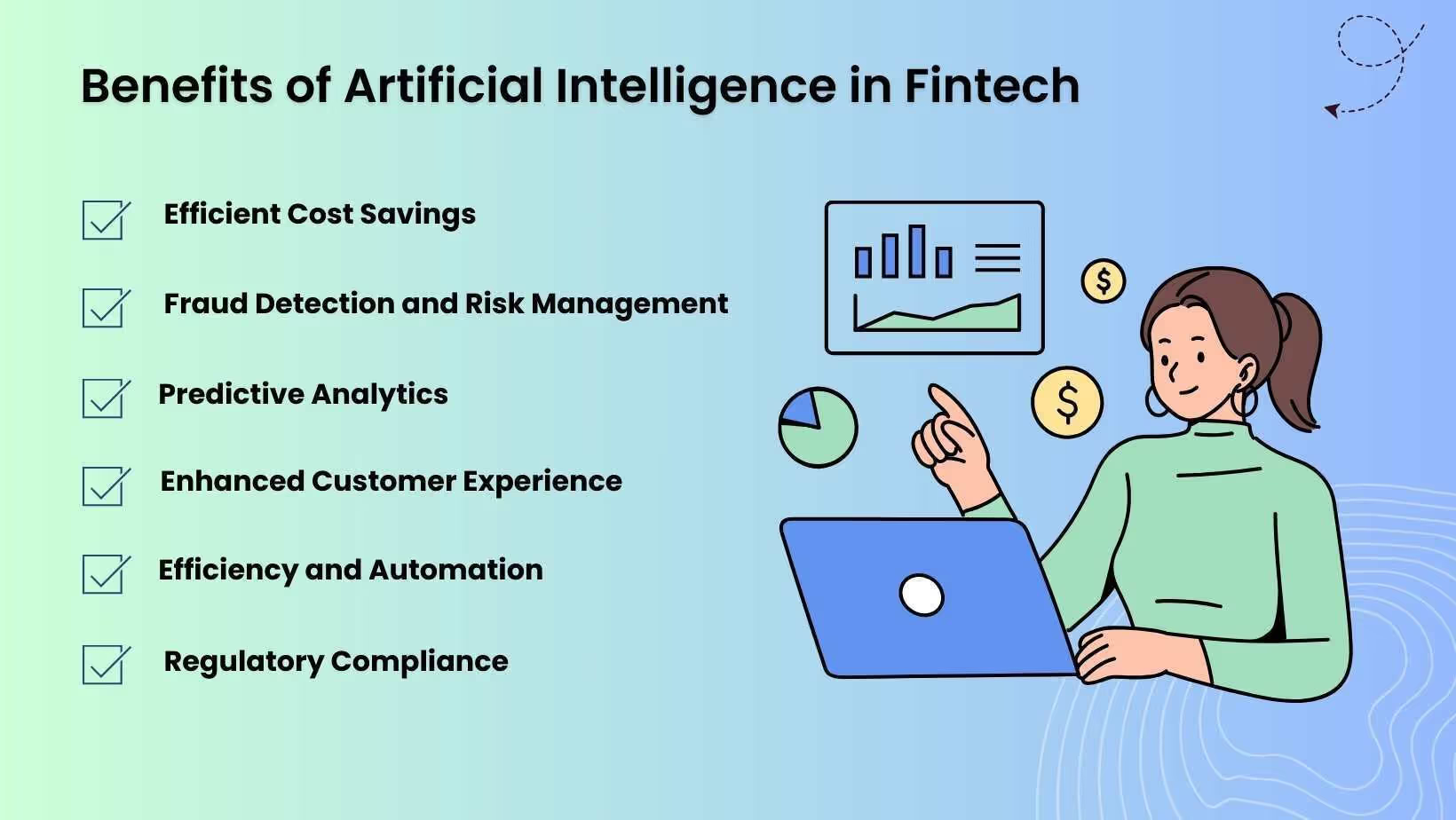The rise of AI in fintech is revolutionizing how financial services are delivered and managed. By leveraging artificial intelligence, fintech companies are offering smarter, faster, and more efficient products and services. From enhancing credit scoring methods to securing financial transactions, AI has become the cornerstone of innovation in financial technology.
The Role of AI in Fintech

AI plays a pivotal role in the fintech sector, driving automation, predictive analytics, and decision-making. These capabilities empower financial industry leaders to identify trends, mitigate risks, and enhance customer experiences.
1. Transforming Customer Experience
AI tools like virtual assistants and AI-powered chatbots are transforming how customers interact with financial services. These tools provide 24/7 support, handling queries, guiding users through complex processes, and streamlining financial transactions in real time. This instant accessibility enhances customer satisfaction and loyalty.
2. Revolutionizing Risk Assessment
Traditional methods of assessing credit risks rely on limited datasets, leading to incomplete evaluations. AI, however, analyzes large and diverse datasets, offering a comprehensive view of customer data. This improves the accuracy of credit scoring, making lending decisions more inclusive and fair.
3. Boosting Operational Efficiency
AI-based automation reduces costs and increases productivity. Tasks like compliance checks, portfolio management, and fraud detection become faster and more accurate, enabling fintech companies to focus on strategic growth.
4. Enhancing Fraud Detection
AI excels at detecting anomalies in financial transactions. By analyzing patterns in real time, AI systems identify potential fraud, protecting both customers and businesses from financial loss.
Also Read: Fintech vs. Traditional Finance: How Technology is Disrupting Accounting
Benefits of AI in Financial Technology

The adoption of AI in the financial industry delivers numerous advantages that drive innovation and growth:
1. Personalization at Scale
AI enables financial services to provide highly personalized solutions tailored to individual customer needs. This capability enhances user engagement and fosters stronger relationships.
2. Accelerated Decision-Making
With real-time analytics, fintech companies can make faster decisions, whether it’s approving a loan application or addressing a potential security breach. This speed is essential in today’s dynamic financial industry.
3. Scalability and Adaptability
AI-based solutions are inherently scalable, allowing organizations to handle increased workloads without a proportional rise in costs. This is particularly beneficial for startups and growing fintech sector firms.
Key Applications of AI in Fintech
1. Chatbots and Virtual Assistants
AI-powered chatbots and virtual assistants enhance customer service by managing routine inquiries, providing financial advice, and assisting with account management. These tools reduce operational strain while improving accessibility.
2. Robo-Advisors
AI-driven robo-advisors offer cost-effective investment management solutions. By analyzing market trends and individual preferences, these platforms provide personalized portfolio recommendations and real-time updates.
3. Fraud Detection Systems
AI algorithms continuously monitor financial transactions, identifying unusual activity that may signal fraud. These systems are vital for safeguarding both customer trust and company assets.
4. Advanced Risk Assessment
AI tools evaluate credit risks with unmatched precision, helping lenders make more informed decisions. They also provide real-time insights into market risks, aiding in strategic planning.
Challenges of Implementing AI in Fintech
Despite its many benefits, integrating AI into financial technology comes with challenges:
1. Data Privacy and Security
The vast amount of customer data processed by AI systems raises concerns about privacy and compliance with regulations like GDPR and CCPA. Companies must implement robust security measures to protect sensitive information.
2. Integration with Legacy Systems
Many established firms in the financial industry rely on outdated infrastructure, making it difficult to integrate advanced AI solutions seamlessly.
3. Ethical Concerns and Bias
AI systems can unintentionally reflect biases present in their training data. This can lead to unfair practices, particularly in lending and hiring. Transparent AI development and regular audits are essential to address these issues.
The Future of AI in Fintech
The potential of AI in fintech continues to expand. Emerging technologies such as blockchain and quantum computing are poised to work in tandem with AI, creating even more robust financial services. By focusing on ethical practices and robust security, the fintech sector can fully harness the transformative power of AI.
Conclusion
The integration of AI in fintech is revolutionizing the financial industry, bringing efficiency, personalization, and innovation to the forefront. From improving credit scoring to enhancing risk assessment, AI offers immense opportunities for growth and customer satisfaction. However, to unlock its full potential, companies must address challenges such as data privacy, ethical concerns, and system integration. As AI continues to evolve, its impact on financial technology will only deepen, shaping a smarter and more secure future for the industry.
FAQs on AI in Fintech
What is the role of AI in fintech?
AI improves efficiency, enhances customer experiences, and enables real-time decision-making. It powers tools like chatbots, fraud detection systems, and robo-advisors.
How does AI improve credit scoring?
AI analyzes diverse and extensive datasets to provide more accurate and inclusive credit scores, helping lenders make better decisions.
What are the main benefits of AI in fintech?
Key benefits include operational efficiency, personalized customer solutions, enhanced fraud detection, and scalability.
What challenges come with using AI in fintech?
Challenges include ensuring data privacy, integrating with legacy systems, and addressing biases in AI algorithms.
How does AI detect fraud in financial transactions?
AI continuously monitors transaction patterns, identifying anomalies and flagging suspicious activities to prevent fraud.


.avif)






